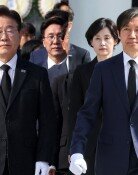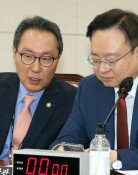OPCON transfer requires stronger combined defense
OPCON transfer requires stronger combined defense
Posted July. 07, 2021 07:16,
Updated July. 07, 2021 07:16
South Korean military authorities have reportedly had an internal review of the reform of a high-level military chain of command in preparation for the transfer of operational control. An in-depth deliberation came after experts’ concerns about the adverse effects of a dual command system where the chairman of the Joint Chiefs of Staff (JCS) controls peacetime operation and ROK-commanded future combined forces commander takes the helm of wartime operation. Experts within and outside the military have proposed to make sure that the chairman of the JCS doubles as the combined forces commander or that combined forces commander takes on the double job as a new position of the joint force commander.
The reason behind the military's idea to revamp the chain of command is that it is concerned that the separation of peacetime and wartime control by the commander in chief and the chairman of the JCS following OPCON transfer may provide the seed for confusion and disruption in the response system to any provocation acts by North Korea. The U.S. and South Korean defense ministers agreed in 2019 that not the chairman of the JCS but a South Korean 4-star general doubles as the commander in chief given the JCS chairman’s heavy work load. However, in response to the argument for a unified chain of command, the military has started seeking solutions.
A failed attempt was made to reshape the military command system during the Lee Myung-bak administration, implying that it has never been an easy job to complete. Back then, the Lee administration came up with a reform plan to change from the existing tri-service system for land, sea and air to a joint force commander system to strengthen military jointness, which was met with opposition and different views from within and outside the military to end up in failure. The South Korean National Defense Ministry denied in a briefing session on Tuesday that the reform of the chain of command is under a review, seemingly with its previous agreement with Washington and the previous unsuccessful attempt in mind.
However, there is no need to be in a hurry as a revamp to the military command system is only a preparatory step to take prior to OPCON transfer. What matters is how the South Korean military can meet the conditions for the transfer - U.S.-R.O.K. combined operations capability. At first, the transfer of operational control was aimed to happen within the current South Korean administration. Since the joint military drills between the two allies have been reduced to a smaller scale, the verification of the combined defense posture has stayed on hold. The South Korean Defense Ministry made an adjustment in effect to the target schedule by changing wording from "early” to "timely” transfer.
The issue of reforming the chain of military command requires not only a behind-the-scenes internal review but also military-wide discussions and coordination as it lays the foundation for a wartime response system that determines the fate of the nation. Furthermore, such a wider level of discussion should target at tightening combined defense readiness based on the two allies’ close cooperative system. From Washington's perspective, it is an unprecedented test to entrust a foreign military with the authority to control the U.S. forces. That is why a deeper level of prior discussions and alignment with Washington should come first.
Headline News
- Israel prepares for retaliation against Iran
- Samsung reclaims top spot, surpassing Apple in smartphone market
- 77% of Koreans in 20s and 30s are 'Kangaroo Tribe' due to job crisis
- KBO referees embroiled in controversy over ABS decision concealment
- Inflation, oil price surge put double shock on global economy







